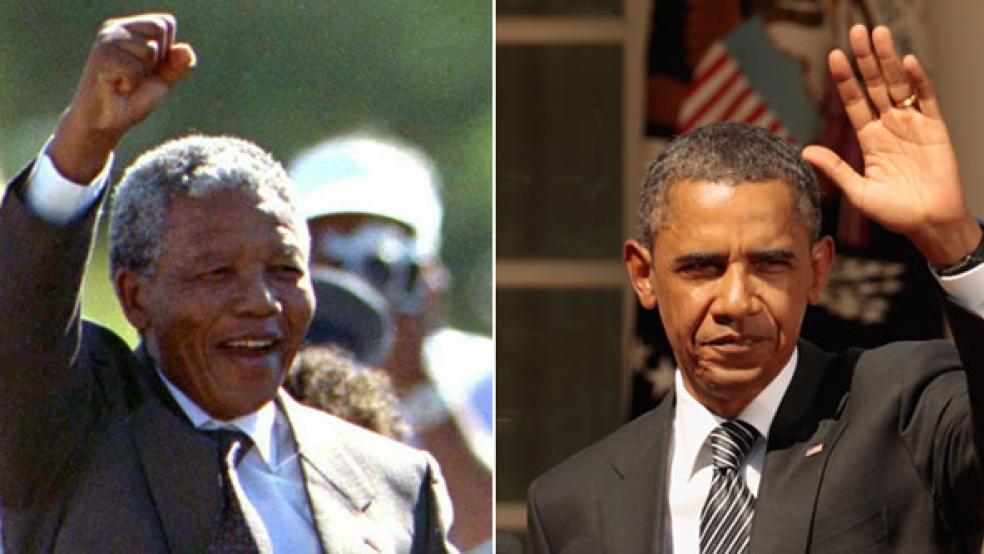President Obama’s eight-day African tour was planned as an attempt to reengage with a continent that has grown frustrated by his lack of attention. But the president’s agenda might be forgotten before the tour even begins.
That’s because the country is keeping a vigil for Nelson Mandela who is close to death.
Mandela, the former South African president who ended apartheid and healed a nation, has been hospitalized for week with a lung infection. South Africans have gathered outside his Pretoria hospital while media there are telling people to prepare for Mandela’s passing.
Obama and Mandela will be forever linked. Both men are transformational political figures who have overcome the madness of racism in order to demonstrate the triumph of man’s better nature. Each has won a Nobel Peace Prize. President Obama has said that Mandela is one of his heroes. And, according to reports, when he was told the president was coming to visit South Africa, Mandela opened his eyes and smiled (as of Wednesday night, there were no plans for Obama to visit Mandela).
While both men are important symbols, the comparison ends there. Mandela united a country that was deeply divided by oppressive policies and government-backed racism. Obama has failed to bring the United States together in a similar way, at least as of this juncture.
MANDELA’S MOMENTS
Look at Mandela’s actions upon his release from prison after serving a punishing 27-year sentence. He immediately called for reconciliation, recognizing that continuing to stoke the fire of racial hatred as a free man would destroy South Africa.
Mandela’s attempt to heal his country was chronicled most notably in the movie Invictus, Mandela also famously wrote his autobiography, the elegant Long Walk to Freedom (1994). But his attempts to remake his country were constant and continuing. He was the ultimate bipartisan.
The history he helped the country move past is among the darkest of the 20th century. Apartheid became official South African policy in 1948. By 1970, blacks were forced to live in “townships,” stripped of all citizenship and civil rights. Despite making up the vast majority of South Africa’s population, they were not allowed to vote. Tens of thousands were killed while resisting white rule, often at the hands of brutal South African police and security forces.
Mandela’s own past was filled with enough hardship and hatred that it would have been easy for him to seek revenge. He was jailed in 1962 and spent the majority of his time at Robben Island Prison, where he was often held in solitary confinement. He was rarely allowed visitors. It took 27 years and an international campaign to free him. Yet when Mandela was released, he showed no resentment for the government that held him. For instance, in 1990 Mandela included all races in an African National Congress (ANC) delegation that was negotiating with Afrikaners. He championed moderate policies that held appeal for all sides involved, even as his party sought retribution. After ANC leader Chris Hani was assassinated by a far-right Polish immigrant in 1993, Mandela called for calm as the country edged toward civil war.
“Our decisions and actions will determine whether we use our pain, our grief and our outrage to move forward to what is the only lasting solution for our country – an elected government of the people, by the people and for the people,” he said in a speech to the nation after Hani was killed.
Mandela pulled his country into the modern world in a way that defies history’s long, slow march. He urged South Africa to move past apartheid quickly and in a way that preserved the nation while creating a new national character.
This outreach continued with the general public. As president and then in his years out of office, Mandela appealed directly to South Africans and citizens of the world. His message was authentic, reasonable and measured.
Compare that to President Obama’s actions as president. When he was first elected in 2008, many Americans hoped he would be a figure that would heal the country after the polarizing George W. Bush administration. But Obama has failed to connect with Republicans or the party’s voters. He’s retreated to his base, and Washington has been stuck in neutral for years.
White House officials have said that Obama has been unable to work with Republicans because they refuse to act in good faith. And there are those in the Republican Party who refuse to recognize the legitimacy of the president. On the night before he took office, his opponents vowed to derail any proposals he put forward.
There were many people, of course, who did not accept Mandela’s legitimacy, either, and opposition to him and his causes was often expressed in violence, not rhetoric. Mandela’s genius lay not just in his political skills but also in his ability to forgive and move forward without allowing resentment to poison his country. He brought all parties to the table and made them feel included in South Africa’s future.
That’s why he holds such a special place in the hearts of South Africans. That’s why the first person South African golfers Louie Oosthuzien and Ernie Els thanked after they won the British Open (in 2010 and 2012, respectively) was Mandela. He saved their country. Without him, they, and their country, would not have succeeded.
When Mandela walked out of prison, the world changed forever. The same thing happened when Obama walked out of the Capitol to be sworn in as U.S. president in 2008.
But Mandela’s true legacy is in what he did next. He denounced evil and hatred and showed his willingness to move beyond deeply entrenched distrust. He was a lion of a man and still is, even as he takes labored breaths as an ill 94-year-old.
Obama’s legacy, of course, has yet to be written. But so far, he’s fallen short of his hero.



